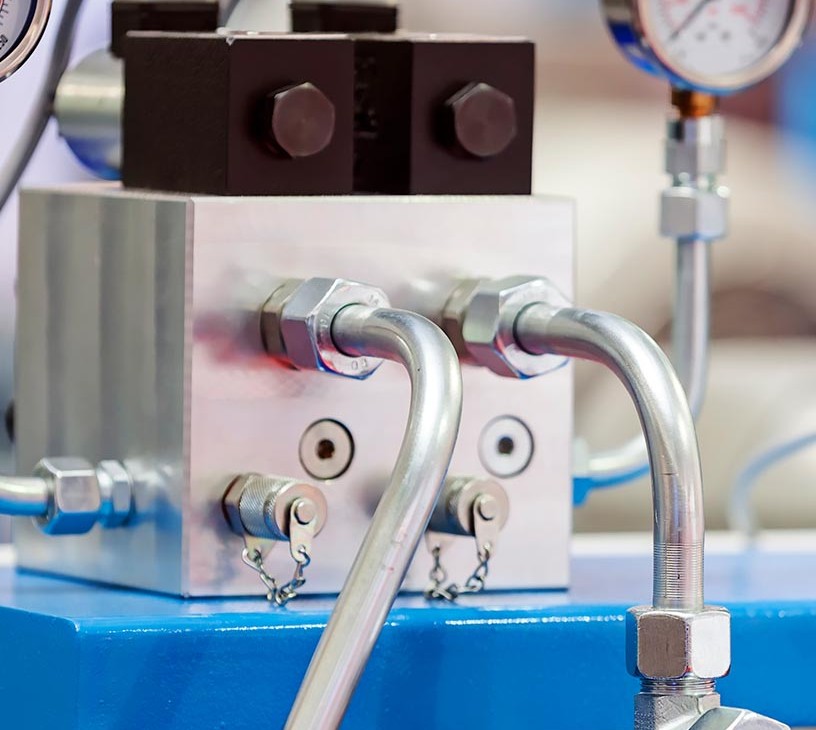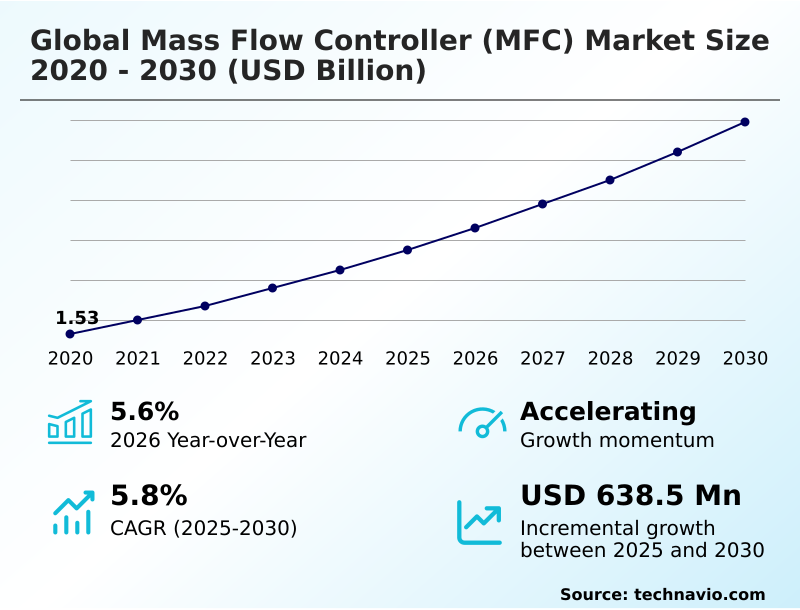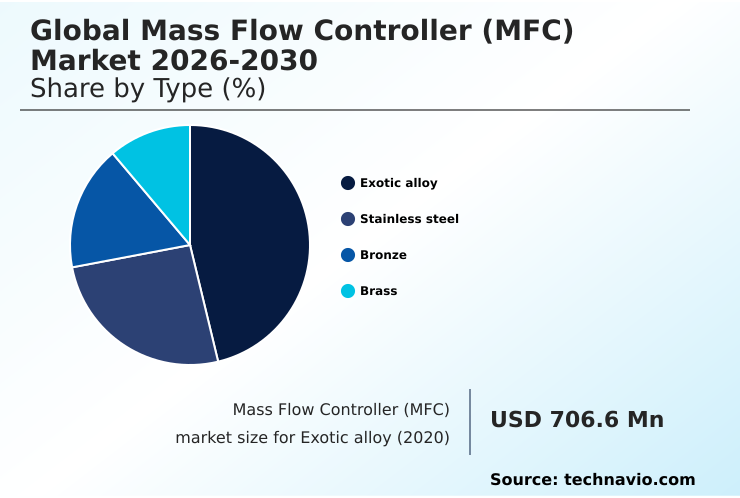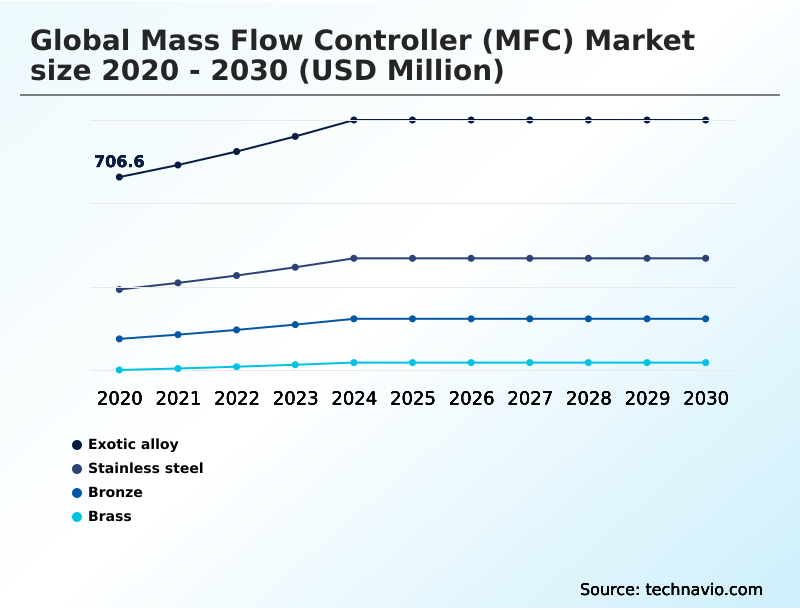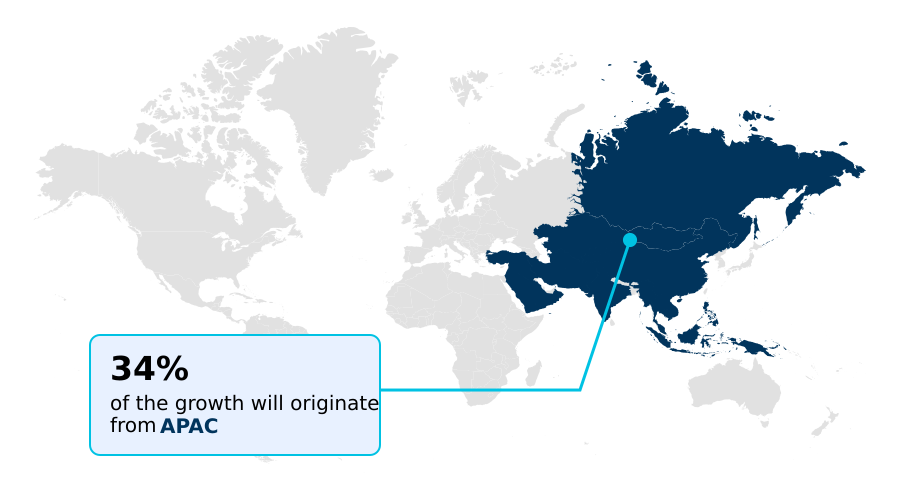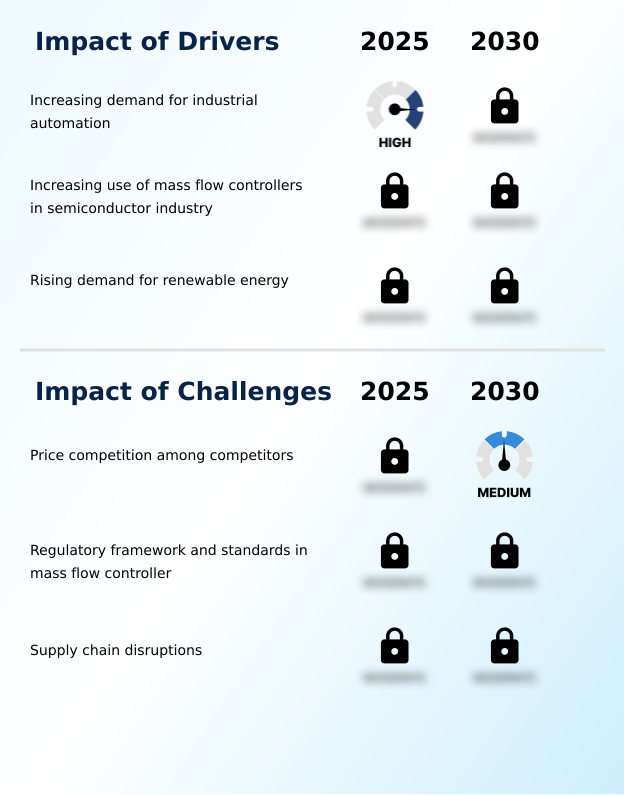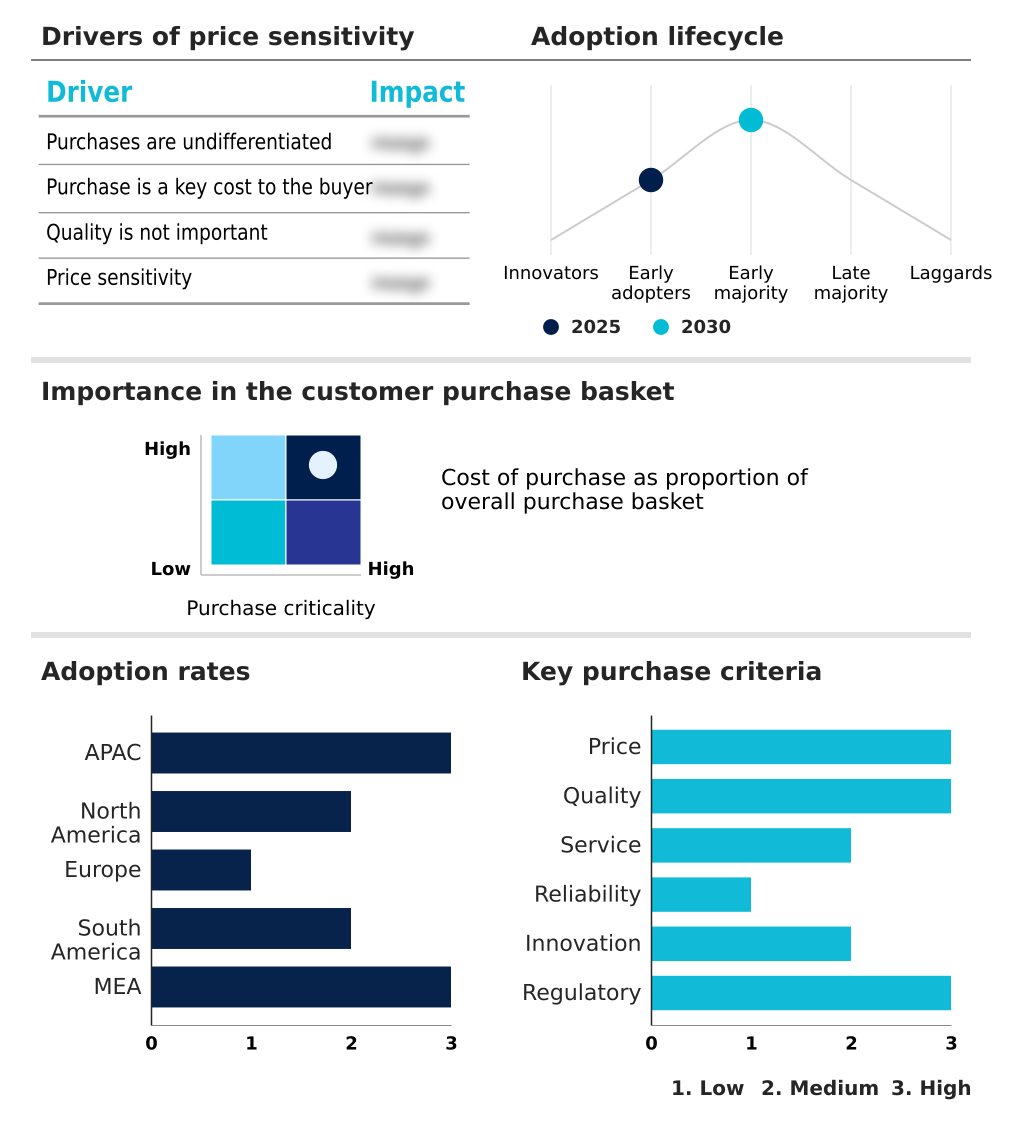Mass Flow Controller (MFC) Market Size 2026-2030
The mass flow controller (mfc) market size is valued to increase by USD 638.5 million, at a CAGR of 5.8% from 2025 to 2030. Increasing demand for industrial automation will drive the mass flow controller (mfc) market.
Major Market Trends & Insights
- APAC dominated the market and accounted for a 34% growth during the forecast period.
- By Type - Exotic alloy segment was valued at USD 865.1 million in 2024
- By End-user - Semiconductor segment accounted for the largest market revenue share in 2024
Market Size & Forecast
- Market Opportunities: USD 1.06 billion
- Market Future Opportunities: USD 638.5 million
- CAGR from 2025 to 2030 : 5.8%
Market Summary
- The mass flow controller (MFC) market is characterized by robust growth, propelled by its critical role in high-precision industries. These instruments are indispensable for sectors demanding exact fluid delivery, such as semiconductor manufacturing, where precise gas mixtures are vital for deposition and etching processes.
- Innovation focuses on enhancing accuracy, achieving multi-gas compatibility, and miniaturization for applications in biotechnology and analytical instrumentation. For example, in bioprocessing, a facility can optimize bioreactor control by using MFCs to maintain specific gas concentrations, directly improving cell culture viability and product consistency, which reduces material waste.
- A primary driver is the pervasive push for automation and efficiency across manufacturing, which underscores the demand for reliable and digitally integrated flow control. However, the market also contends with challenges related to the high cost of advanced materials and the need for continuous R&D to meet evolving industrial standards, which can impact pricing and accessibility for smaller enterprises.
- The integration of advanced sensor technologies and predictive maintenance capabilities is a key trend, making MFCs smarter and more integral to Industry 4.0 frameworks, thus ensuring their continued relevance and expansion.
What will be the Size of the Mass Flow Controller (MFC) Market during the forecast period?
Get Key Insights on Market Forecast (PDF) Request Free Sample
How is the Mass Flow Controller (MFC) Market Segmented?
The mass flow controller (mfc) industry research report provides comprehensive data (region-wise segment analysis), with forecasts and estimates in "USD million" for the period 2026-2030, as well as historical data from 2020-2024 for the following segments.
- Type
- Exotic alloy
- Stainless steel
- Bronze
- Brass
- End-user
- Semiconductor
- Oil and gas
- Chemical
- Metal and mining
- Others
- Product type
- Gas
- Liquid
- Geography
- APAC
- China
- South Korea
- Japan
- North America
- US
- Canada
- Mexico
- Europe
- Germany
- France
- UK
- South America
- Brazil
- Argentina
- Middle East and Africa
- Saudi Arabia
- UAE
- South Africa
- Rest of World (ROW)
- APAC
By Type Insights
The exotic alloy segment is estimated to witness significant growth during the forecast period.
The market for mass flow controllers integrating exotic alloys is expanding, driven by advanced manufacturing sectors where superior material integrity is non-negotiable.
These alloys are crucial for applications involving corrosive gas handling and high-pressure applications, particularly in pharmaceutical manufacturing and semiconductor fabrication processes. Maintaining process purity and ensuring leak integrity are paramount in these sterile environments, necessitating materials that resist degradation.
For instance, advanced atomic layer deposition systems designed for next-generation semiconductor production have demonstrated a 15% reduction in unplanned downtime by integrating MFCs with exotic alloy wetted parts for precise chemical vapor deposition.
This highlights the critical role of these materials in enabling sub-nanometer scale manufacturing and facilitating seamless OEM integration within cleanroom applications.
The Exotic alloy segment was valued at USD 865.1 million in 2024 and showed a gradual increase during the forecast period.
Regional Analysis
APAC is estimated to contribute 34% to the growth of the global market during the forecast period.Technavio’s analysts have elaborately explained the regional trends and drivers that shape the market during the forecast period.
See How Mass Flow Controller (MFC) Market Demand is Rising in APAC Request Free Sample
The geographic landscape of the mass flow controller (MFC) market is defined by concentrated industrial activity in key regions. APAC leads in market expansion, accounting for over 33% of the incremental growth, driven by its dominant semiconductor manufacturing sector.
Countries like Taiwan and South Korea are epicenters for advanced wafer fabrication, requiring ultra-high purity gas delivery systems and advanced sensor technologies for critical plasma etching processes.
In North America, which holds a significant market share, growth is supported by investments in biotechnology and renewable energy, particularly in the US. Here, MFCs with fast response times are crucial for bioreactor control.
Europe's market is bolstered by its strong chemical and automotive industries, with Germany being a key contributor. The deployment of microthermal MFCs for process gas analysis in environmental monitoring is a notable application, improving regulatory compliance and reducing emissions.
Market Dynamics
Our researchers analyzed the data with 2025 as the base year, along with the key drivers, trends, and challenges. A holistic analysis of drivers will help companies refine their marketing strategies to gain a competitive advantage.
- The evolving requirements across high-tech industries are shaping the development of specialized mass flow controllers. For instance, the demand for a mass flow controller for hydrogen applications is surging with the growth of the green energy sector, where precise control is vital for fuel cell efficiency.
- In parallel, laboratory and research settings are driving the need for a high accuracy low flow rate controller to handle sensitive experiments. The choice between a thermal mass flow meter vs controller often depends on whether measurement alone is sufficient or if active regulation is required.
- For applications demanding the highest precision with fluids, a coriolis mass flow controller for liquids is the preferred solution due to its direct mass measurement capabilities.
- In bioprocessing, the integration of a mass flow controller for bioreactors is standard for managing gas mixtures, while industrial settings are seeing wider adoption of a digital mass flow controller with ethercat for better system integration.
- In semiconductor manufacturing, an mfc for semiconductor process gas must handle aggressive chemistries, making a mass flow controller for corrosive gases essential for processes like thin film deposition and controlling gas flow in sputtering processes. The technical distinctions between analog vs digital mass flow controllers are significant, with digital models offering superior diagnostics and flexibility.
- Understanding the mass flow controller turndown ratio explained in datasheets is crucial for selecting a device with the right operational range. Facilities often rely on professional mass flow controller calibration services to maintain accuracy.
- Other specific applications include a mass flow controller for food grade nitrogen in packaging, a compact mass flow controller for oem equipment, and a mass flow controller for furnace control, which shows a 20% improvement in temperature stability over manual systems.
- The use of a multi-gas mass flow controller calibration reduces the need for multiple single-gas devices, and improving gas mixing with digital mfc technology is a key focus for process engineers.
What are the key market drivers leading to the rise in the adoption of Mass Flow Controller (MFC) Industry?
- The increasing demand for industrial automation, which necessitates precise and accurate control of liquids and gases, is a key driver for the market.
- The primary driver for the mass flow controller market is the increasing need for industrial automation systems and precision in manufacturing.
- Industries from semiconductor wafer fabrication to analytical instrumentation rely on the high accuracy measurement and high turndown ratio of modern MFCs. The demand for automated process control is universal, as it directly impacts yield, quality, and operational costs.
- For example, in thin-film deposition processes, precise process control instrumentation can reduce material waste by over 20%.
- The ability of MFCs to provide stable and repeatable precision fluid measurement is essential for industrial gas distribution networks and complex gas blending systems.
- As industries continue to pursue higher efficiency and stricter quality standards, the role of advanced flow control solutions becomes increasingly critical, driving consistent market demand.
What are the market trends shaping the Mass Flow Controller (MFC) Industry?
- The increasing use of advanced materials, such as exotic alloys and high-performance polymers, is a significant trend. This shift is driven by the need to enhance the performance and dependability of mass flow controllers in demanding applications.
- Key trends in the mass flow controller market are centered on digitalization and material science. The adoption of smart MFCs with advanced digital communication protocols and predictive maintenance capabilities is rising, with implementations in bioreactor process control showing a 15% improvement in batch consistency.
- This trend toward microfluidics and MEMS-based flow sensors enables more compact and efficient designs for applications like fuel cell technology. Furthermore, the use of advanced materials with superior multi-gas compatibility is expanding, particularly for handling aggressive chemicals in additive manufacturing atmospheres. The integration of IoT allows for real-time monitoring and process optimization, contributing to enhanced operational efficiency.
- In food processing, MFCs used for modified atmosphere packaging have been shown to extend product shelf life by up to 50%.
What challenges does the Mass Flow Controller (MFC) Industry face during its growth?
- Intense price competition among a wide range of manufacturers presents a significant challenge, compelling them to balance competitive pricing with sustainable profitability.
- The mass flow controller market faces challenges related to technical complexity and cost management. While technologies like Coriolis force measurement and thermal mass flow sensing offer superior accuracy, their implementation increases device cost. Ensuring pressure insensitivity and precise volumetric control across diverse operating conditions requires sophisticated engineering.
- For high-purity applications, maintaining system integrity involves complex high-purity piping systems and rigorous leak testing equipment, adding to the total cost of ownership. Moreover, the need for regular recalibration using certified gas calibration standards presents an ongoing operational expense.
- In sectors like pharmaceuticals, where MFCs are used in liquid chromatography, the high initial investment can be a barrier for smaller labs, despite the long-term benefits of improved gravimetric control and analytical precision.
Exclusive Technavio Analysis on Customer Landscape
The mass flow controller (mfc) market forecasting report includes the adoption lifecycle of the market, covering from the innovator’s stage to the laggard’s stage. It focuses on adoption rates in different regions based on penetration. Furthermore, the mass flow controller (mfc) market report also includes key purchase criteria and drivers of price sensitivity to help companies evaluate and develop their market growth analysis strategies.
Customer Landscape of Mass Flow Controller (MFC) Industry
Competitive Landscape
Companies are implementing various strategies, such as strategic alliances, mass flow controller (mfc) market forecast, partnerships, mergers and acquisitions, geographical expansion, and product/service launches, to enhance their presence in the industry.
Aalborg Instruments - Key offerings are centered on precision fluid measurement and control technology, engineered for high-performance applications demanding exceptional accuracy and reliability.
The industry research and growth report includes detailed analyses of the competitive landscape of the market and information about key companies, including:
- Aalborg Instruments
- Alicat Scientific
- Axetris AG
- Azbil Corp.
- Bronkhorst High Tech B.V.
- Brooks Instrument LLC
- Christian Burkert GmbH and Co.
- Entegris Inc.
- Hitachi High Tech Corp.
- HORIBA Ltd.
- Kuwana Metals, Ltd
- MKS Instruments Inc.
- Omega Engineering Inc.
- Parker Hannifin Corp.
- Sensirion AG
- Sierra Instruments Inc.
- Teledyne Technologies inc
- Thermal Instrument Company
- TOKYO KEISO CO., LTD
- Vogtlin Instruments GmbH
Qualitative and quantitative analysis of companies has been conducted to help clients understand the wider business environment as well as the strengths and weaknesses of key industry players. Data is qualitatively analyzed to categorize companies as pure play, category-focused, industry-focused, and diversified; it is quantitatively analyzed to categorize companies as dominant, leading, strong, tentative, and weak.
Recent Development and News in Mass flow controller (mfc) market
- In September, 2024, a major semiconductor manufacturer announced substantial investments in new wafer fabrication plants, driving demand for advanced MFC solutions to support high-volume operations.
- In November, 2024, a leading biotechnology firm unveiled plans for a new biologics manufacturing facility, emphasizing the requirement for stringent process control using MFCs in fermentation applications.
- In January, 2025, a consortium of European energy companies announced a collaborative project to scale up green hydrogen production, highlighting the need for reliable MFCs to manage gas flows in electrolyzers.
- In April, 2025, a prominent additive manufacturing company showcased new large-scale metal 3D printers that rely on MFCs for precise atmospheric control, ensuring material integrity and product quality.
Dive into Technavio’s robust research methodology, blending expert interviews, extensive data synthesis, and validated models for unparalleled Mass Flow Controller (MFC) Market insights. See full methodology.
| Market Scope | |
|---|---|
| Page number | 296 |
| Base year | 2025 |
| Historic period | 2020-2024 |
| Forecast period | 2026-2030 |
| Growth momentum & CAGR | Accelerate at a CAGR of 5.8% |
| Market growth 2026-2030 | USD 638.5 million |
| Market structure | Fragmented |
| YoY growth 2025-2026(%) | 5.6% |
| Key countries | China, Taiwan, South Korea, Japan, India, Australia, US, Canada, Mexico, Germany, France, UK, Italy, Spain, The Netherlands, Brazil, Argentina, Chile, Saudi Arabia, UAE, South Africa, Egypt and Turkey |
| Competitive landscape | Leading Companies, Market Positioning of Companies, Competitive Strategies, and Industry Risks |
Research Analyst Overview
- The mass flow controller (MFC) market is advancing through continuous innovation in core technologies such as thermal mass flow sensing and Coriolis force measurement. These devices deliver ultra-high purity gas delivery, which is non-negotiable in semiconductor fabrication and other sterile environments.
- The push for miniaturization is enabling new applications in microfluidics and portable analytical equipment, supported by MEMS-based flow sensors and advanced sensor technologies. For boardroom decisions, the integration of predictive maintenance capabilities via digital communication protocols is a key strategic advantage, with some operators reporting a 15% reduction in unplanned downtime.
- This aligns with a broader industry focus on automated process control and high turndown ratio performance. Key technical differentiators include fast response time, high accuracy measurement, pressure insensitivity, and robust leak integrity.
- Manufacturers are leveraging fluid control expertise to develop solutions with multi-gas compatibility, superior corrosive gas handling, and suitability for high-pressure applications, ensuring precise volumetric control and gravimetric control in the most demanding process control instrumentation scenarios. The development of microthermal MFCs further diversifies the available solutions.
What are the Key Data Covered in this Mass Flow Controller (MFC) Market Research and Growth Report?
-
What is the expected growth of the Mass Flow Controller (MFC) Market between 2026 and 2030?
-
USD 638.5 million, at a CAGR of 5.8%
-
-
What segmentation does the market report cover?
-
The report is segmented by Type (Exotic alloy, Stainless steel, Bronze, and Brass), End-user (Semiconductor, Oil and gas, Chemical, Metal and mining, and Others), Product Type (Gas, and Liquid) and Geography (APAC, North America, Europe, South America, Middle East and Africa)
-
-
Which regions are analyzed in the report?
-
APAC, North America, Europe, South America and Middle East and Africa
-
-
What are the key growth drivers and market challenges?
-
Increasing demand for industrial automation, Price competition among competitors
-
-
Who are the major players in the Mass Flow Controller (MFC) Market?
-
Aalborg Instruments, Alicat Scientific, Axetris AG, Azbil Corp., Bronkhorst High Tech B.V., Brooks Instrument LLC, Christian Burkert GmbH and Co., Entegris Inc., Hitachi High Tech Corp., HORIBA Ltd., Kuwana Metals, Ltd, MKS Instruments Inc., Omega Engineering Inc., Parker Hannifin Corp., Sensirion AG, Sierra Instruments Inc., Teledyne Technologies inc, Thermal Instrument Company, TOKYO KEISO CO., LTD and Vogtlin Instruments GmbH
-
Market Research Insights
- The mass flow controller (MFC) market is shaped by the convergence of industrial automation systems and the demand for process optimization. The adoption of advanced MFCs in wafer fabrication has been shown to improve process repeatability by up to 25%, a critical factor in semiconductor yield.
- In analytical instrumentation, devices with enhanced digital communication protocols can reduce calibration times by 40%, boosting laboratory throughput. Furthermore, integration with industrial gas distribution networks for applications like thin-film deposition showcases how precision fluid measurement supports quality control. The move toward high-turndown ratio devices offers greater operational flexibility, allowing a single controller to serve multiple functions, thereby reducing capital expenditure.
- These dynamics illustrate a market driven by tangible efficiency gains and the need for more sophisticated process control instrumentation.
We can help! Our analysts can customize this mass flow controller (mfc) market research report to meet your requirements.
